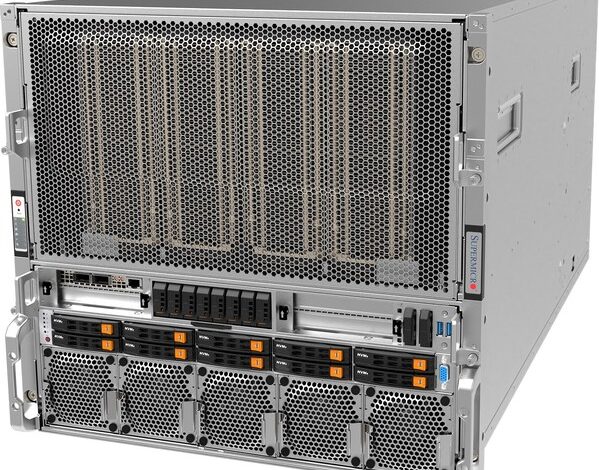Supermicro Previews New Max Performance Intel-based X14 Servers for AI, HPC, and Critical Enterprise Work
A Complete Architecture Upgrade that Includes New Performance-Optimised CPUs, Next-Generation GPU support, Upgraded Memory MRDIMMs, and More

Supermicro, Inc., a total IT solutions provider for Artificial Intelligence/Machine Learning (AI/ML), HPC, Cloud, Storage, and 5G/Edge, is previewing new, completely redesigned X14 server platforms that will leverage next-generation technologies to maximise performance for compute-intensive workloads and applications.
Building on the success of Supermicro’s efficiency-optimised X14 servers that launched in June 2024, the new systems feature significant upgrades across the board, supporting a never-before-seen 256 performance cores (P-cores) in a single node, memory support up for MRDIMMs at 8800MT/s, and compatibility with next-generation SXM, OAM, and PCIe GPUs. This combination can drastically accelerate AI and compute as well as significantly reduce the time and cost of large-scale AI training, high-performance computing, and complex data analytics tasks. Approved customers can secure early access to complete, full-production systems via Supermicro’s Early Ship Program or for remote testing with Supermicro JumpStart.
“We continue to add to our already comprehensive Data Centre Building Block solutions with these new platforms, which will offer unprecedented performance, and new advanced features,” said Charles Liang, President and CEO at Supermicro. “Supermicro is ready to deliver these high-performance solutions at rack-scale with the industry’s most comprehensive direct-to-chip liquid-cooled, total rack integration services, and a global manufacturing capacity of up to 5,000 racks per month including 1,350 liquid-cooled racks. With our worldwide manufacturing capabilities, we can deliver fully optimised solutions which accelerate our time-to-delivery like never before, while also reducing TCO.”
Click here for more information.
Supermicro Redesigns Servers
These new X14 systems feature completely redesigned architectures including new 10U and multi-node form factors to enable support for next-generation GPUs and higher CPU densities, updated memory slot configurations with 12 memory channels per CPU and new MRDIMMs which provide up to 37% better memory performance compared to DDR5-6400 DIMMS. In addition, upgraded storage interfaces will support higher drive densities, and more systems with liquid cooling integrated directly into the server architecture.
The new additions to the Supermicro X14 family comprise more than ten new systems, several of which are completely new architectures in three distinct, workload-specific categories:
- GPU-optimised platforms designed for pure performance and enhanced thermal capacity to support the highest-wattage GPUs. System architectures have been built from the ground up for large-scale AI training, large language models (LLMs), generative AI, 3D media, and virtualisation applications.
- High compute-density multi-nodes including SuperBlade® and the all-new FlexTwin™, which leverage direct-to-chip liquid cooling to significantly increase the number of performance cores in a standard rack compared to previous generations of systems.
- Market-proven Hyper rackmounts combine single or dual socket architectures with flexible I/O and storage configurations in traditional form factors to help enterprises and data centers scale up and out as their workloads evolve.
Supermicro X14 performance-optimised systems will support the soon-to-be-released Intel® Xeon® 6900 series processors with P-cores and will also offer socket compatibility to support Intel Xeon 6900 series processors with E-cores in Q1’25. This designed-in feature allows workload-optimised systems for either performance-per-core or performance-per-watt.
“The new Intel Xeon 6900 series processors with P-cores are our most powerful ever, with more cores and exceptional memory bandwidth & I/O to achieve new degrees of performance for AI and compute-intensive workloads,” said Ryan Tabrah, VP and GM of Xeon 6 at Intel. “Our continued partnership with Supermicro will result in some of the industry’s most powerful systems that are ready to meet the ever-heightening demands of modern AI and high-performance computing.”
When configured with Intel Xeon 6900 series processors with P-cores, Supermicro systems support new FP16 instructions on the built-in Intel® AMX accelerator to further enhance AI workload performance. These systems include 12 memory channels per CPU with support for both DDR5-6400 and MRDIMMs up to 8800MT/s, CXL 2.0, and feature more extensive support for high-density, industry-standard EDSFF E1.S and E3.S NVMe drives.
Supermicro Liquid Cooling Solutions
Complementing this expanded X14 product portfolio are Supermicro’s rack-scale integration and liquid cooling capabilities. With an industry-leading global manufacturing capacity, extensive rack-scale integration and testing facilities, and a comprehensive suite of management software solutions, Supermicro designs, builds, tests, validates, and delivers complete solutions at any scale in a matter of weeks.
In addition, Supermicro offers a complete in-house developed liquid cooling solution, including cold plates for CPUs, GPUs, and memory, Cooling Distribution Units, Cooling Distribution Manifolds, hoses, connectors, and cooling towers. Liquid cooling can be easily included in rack-level integrations to further increase system efficiency, reduce instances of thermal throttling, and lower both the TCO and Total Cost to Environment (TCE) of data centre deployments.
Upcoming Supermicro X14 performance-optimised systems include:
- GPU-optimised. The highest performance Supermicro X14 systems designed for large-scale AI training, LLMs, generative AI, and HPC, and supporting eight of the latest-generation SXM5 and SXM6 GPUs. These systems are available in air-cooled or liquid-cooled configurations.
- PCIe GPU. Designed for maximum GPU flexibility, supporting up to 10 double-width PCIe 5.0 accelerator cards in a thermally optimised 5U chassis. These servers are ideal for media, collaborative design, simulation, cloud gaming, and virtualisation workloads.
- Intel® Gaudi® 3 AI Accelerators. Supermicro also plans to deliver the industry’s first AI server based on the Intel Gaudi 3 accelerator hosted by Intel Xeon 6 processors. The system is expected to increase efficiency and lower the cost of large-scale AI model training and AI inferencing. The system features eight Intel Gaudi 3 accelerators on an OAM universal baseboard, six integrated OSFP ports for cost-effective scale-out networking, and an open platform designed to use a community-based, open-source software stack, requiring no software licensing costs.
- SuperBlade®. Supermicro’s X14 6U high-performance, density-optimised, and energy-efficient SuperBlade maximizes rack density, with up to 100 servers and 200 GPUs per rack. Optimized for AI, HPC, and other compute-intensive workloads, each node features air cooling or direct-to-chip liquid cooling to maximise efficiency and achieve the lowest PUE with the best TCO, as well as connectivity up to four integrated Ethernet switches with 100G uplinks and front I/O supporting a range of flexible networking options up to 400G InfiniBand or 400G Ethernet per node.
- FlexTwin™. The new Supermicro X14 FlexTwin architecture is designed to provide maximum compute power and density in a multi-node configuration with up to 24,576 performance cores in a 48U rack. Optimised for HPC and other compute-intensive workloads, each node features direct-to-chip liquid cooling only to maximise efficiency and reduce instances of CPU thermal throttling, as well as HPC Low Latency front and rear I/O supporting a range of flexible networking options up to 400G per node.
- Hyper. X14 Hyper is Supermicro’s flagship rackmount platform designed to deliver the highest performance for demanding AI, HPC, and enterprise applications, with single or dual socket configurations supporting double-width PCIe GPUs for maximum workload acceleration. Both air cooling and direct-to-chip liquid cooling models are available to facilitate the support of top-bin CPUs without thermal limitations and reduce data centre cooling costs while also increasing efficiency.




